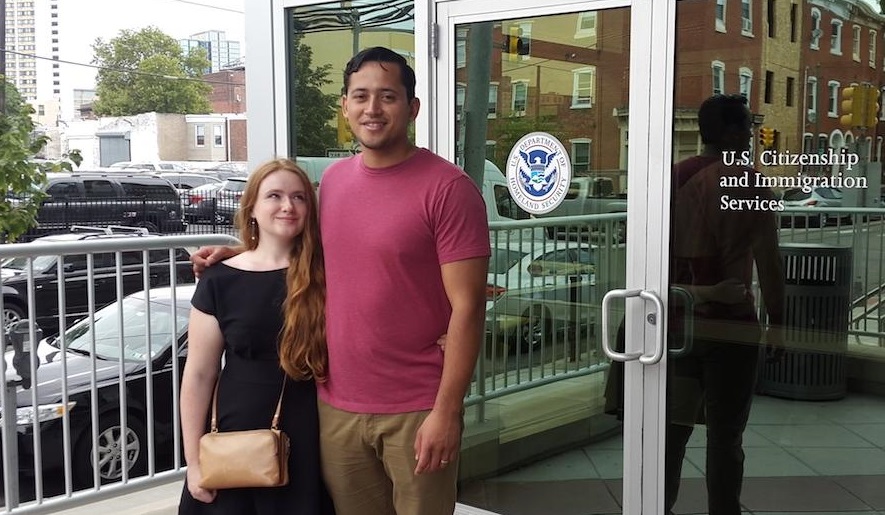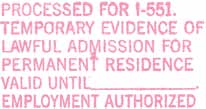What to Expect at your Adjustment of Status Interview at USCIS

First of all, don’t get anxious just because U.S. Citizenship and Immigration Services (USCIS) sent you an appointment notice for an I-485 interview. Almost everyone must go through an interview during the adjustment of status process. In fact, there’s reason to get excited. The I-485 interview is likely the last step in your application process. If all goes well, you’ll be a permanent resident (green card holder) at the end of the interview.
Interviews are a standard part of the process after filing Form I-485, Application to Adjust Status. The I-485 interview is almost a certainty if you submitted an adjustment of status application on the basis of marriage. USCIS may waive the interview for some applicants with especially straight forward cases with strong evidence. But this is the exception.
Who Attends Adjustment of Status Interview
USCIS will generally schedule the interview at an office nearest you. In some areas of the country, this may require a long drive and an overnight stay. For family-based I-485 applications, USCIS generally requires both the applicant and petitioner to attend the I-485 interview. They will make a decision to waive the interview on a case-by-case basis. You can’t request USCIS to waive the interview, and you should always expect one for marriage-based applications. In some non-marriage based cases, USCIS may require only the applicant to attend the adjustment of status interview. However, USCIS does not require employers to attend interviews for employment-based I-485 applications.
Derivative applicants should also expect to attend. If you have a spouse and children that are applying for permanent residence based on your eligibility, they are known as derivative applicants and must appear regardless of the filing category.
Use of an Interpreter
An applicant who is not fluent in English may require the help of an interpreter for the I-485 interview. Also known as a translator, the interpreter should be a disinterested party. In other words, the interpreter should not have a clear bias. For example, the petitioner has a bias to see your application approved and is typically not a satisfactory interpreter. However, you don’t necessarily need to pay someone to translate. An immigration officer may exercise discretion to allow a friend of the applicant to act as interpreter. If the officer is fluent in the applicant’s preferred language, the officer may conduct the examination in that language without use of an interpreter.
The interpreter should take a valid, government-issued identity document and a prepared Form G-1256 (Declaration for Interpreted USCIS Interview) to USCIS on the day of the I-485 interview. The applicant and interpreter both sign Form G-1256 at the interview in front of the officer.
The USCIS officer may disqualify an interpreter provided by the applicant if the officer believes the integrity of the examination is compromised by the interpreter’s participation or the officer determines the interpreter is not competent to translate.
Items to Take to Interview
The USCIS appointment notice will include a list of items to take to your I-485 interview. Follow the directions on your appointment notice, but this list will get you prepared for the I-485 interview. You should expect to take the following items:
- A government-issued photo identification such as a passport (even if expired) but can also be any other government-issued photo ID like a driver’s license.
- Appointment notice (I-797C, Notice of Action) for your I-485 interview.
- A complete copy of your adjustment of status application package. In addition to Form I-485, have available any other forms (e.g. I-130, I-130A, I-864, I-131, I-765) you may have submitted.
- Originals of any supporting documents that you submitted to USCIS with the adjustment of status application. Especially important examples include birth, marriage and death certificates as well as divorce decrees (if applicable).
- Your passport (unless you are in certain categories such as refugee/asylum).
- Any other travel documents, for example your advance parole permit if you traveled while awaiting your interview.
- Doctor’s report from your required medical examination on Form I-693 (if you did not submit this report with the original adjustment application).
- If applying based on employment, an up-to-date employment verification letter from your employer, documenting continued employment at a specified salary.
- If applying based on marriage, copies plus originals of documents showing your shared life, such as a joint lease or mortgage, joint bank account or credit card statements, children’s birth certificates, and so on.
The USCIS officer will likely ask if you have any life changes that may affect your adjustment of status application. The officer is looking for anything that may change an answer on your application. Some examples include the birth of a child, new employer, or new address. If your changes include an arrest or other immigration issues, speak to an immigration attorney before attending your I-485 interview.
RECOMMENDED: Adjustment of Status Denial Due to Changes in Circumstances
Typical Questions at an I-485 Interview
The typical adjustment of status interview lasts approximately 20 to 25 minutes. After introductions and swearing in, that doesn’t leave much time for questioning. It’s also not necessary to memorize answers to any questions. For the most part, the USCIS will ask you questions about your application and ask you to verify or explain certain answers. If you’ve truthfully answered questions on Form I-485, there’s no reason to be nervous or anxious.
For applicants that filed an adjustment of status application based on spousal relationship, the questions may get slightly more personal. USCIS wants confirmation that the marriage is bona fide. In other words, they will scrutinize the application more to make sure there’s no marriage fraud. But again, as long as you can be truthful, they are simple questions and answers.
Sample I-485 Interview Questions for Spouses
- How, when and where did you meet your spouse?
- Where and with whom did your spouse live when you met your spouse?
- Who lives at your address now?
- What is your spouse’s date of birth?
- Where did your spouse work when you met him/her?
- What type of work does your spouse do?
- What is your spouse’s work schedule?
- How much is your spouse’s salary?
- Are both spouses’ salaries deposited into the same bank account?
- What bank account do you use?
- Did your spouse have a car when you met? What model, color, etc?
- Are these the cars you and your spouse current drive?
- If not, when did you and/or your spouse change cars?
- If you now have cars, how much money is owed on them? How much is the monthly payment?
- When did you and your spouse decide to get married? Was there a proposal? Who proposed? When and where did it take place?
- Did you and your spouse live together prior to your marriage? Where and how long?
- When did you and your spouse move in together?
- When did you get married?
- If you had a celebration, what food/beverages were served?
- Did you and your spouse go on a honeymoon? If yes, where?
- Who pays the rent/mortgage? How is it paid? (Do you mail it? Hand-deliver it?)
- Where does your landlord live?
- How many sleeping rooms does your home have?
- Are all the sleeping rooms on the same side of the home?
- What size bed do you and your spouse have?
- Can you describe the pieces of furniture in your bedroom?
This is a small sampling of possible questions. In practice, USCIS may ask a wide variety of questions to help make a determination if you and your spouse have a bona fide marriage.
After the Interview

If everything goes well at your adjustment of status interview, the USCIS officer will approve your I-485 application. In some cases the officer may be able to place an “I-551 stamp” inside your passport. Regardless, USCIS will process the new green card and mail it to your address on record.
However, not all adjustment of status interviews end with a decision. The USCIS officer may tell you that you will receive a decision in the mail. Don’t be discouraged. This isn’t unusual.
It’s also possible that a USCIS officer cannot approve your case because additional evidence is required. If USCIS requests additional evidence, be certain to submit the documentation requested by the deadline issued. USCIS will send you a decision by mail.
If it’s been 90 days since your I-485 interview and you still don’t have a decision, call USCIS at 1-800-375-5283 to schedule an InfoPass appointment. It’s important to follow up.
About CitizenPath
CitizenPath provides simple, affordable, step-by-step guidance through USCIS immigration applications. Individuals, attorneys and non-profits use the service on desktop or mobile device to prepare immigration forms accurately, avoiding costly delays. CitizenPath allows users to try the service for free and provides a 100% money-back guarantee that USCIS will approve the application or petition. We provide support for the Adjustment of Status Application (I-485), Petition for Alien Relative (Form I-130), and several other immigration services.
Note to Reader: This post was originally published on January 23, 2018, and has been modified with improvements.
Want more immigration tips and how-to information for your family?
Sign up for CitizenPath’s FREE immigration newsletter and
SAVE 10%
on our immigration services



